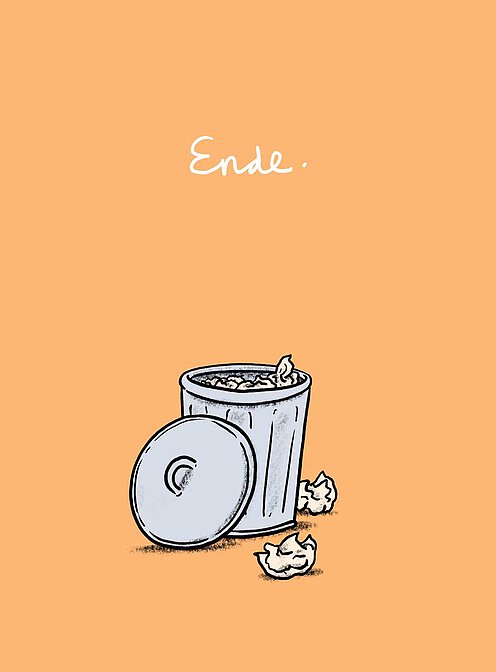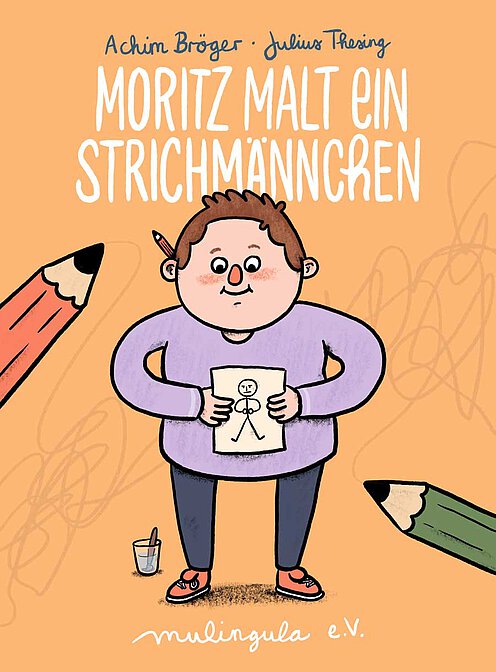
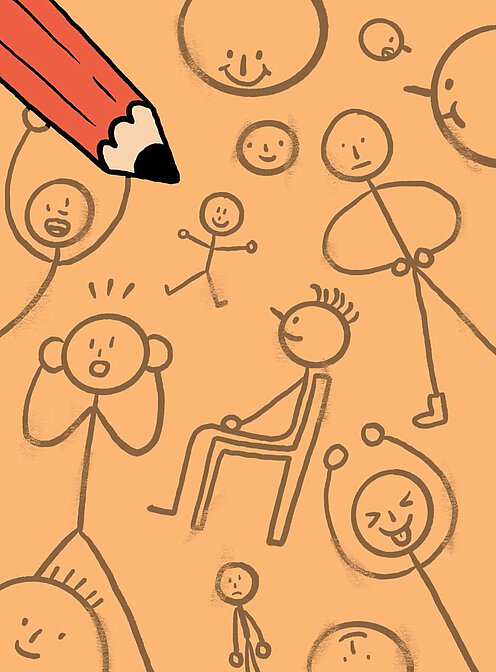
Illustration: Julius Thesing
Sprecher Deutsch: Stephan Niemand
Übersetzer Englisch: Jan Bruder
Sprecherin Englisch: Karen Hubeny
© Mulingula e.V., lizensiert unter CC BY-NC-ND 4.0

Moritz malt ein Strichmännchen
von Achim Bröger

Moritz Draws a Stick Figure
by Achim Bröger
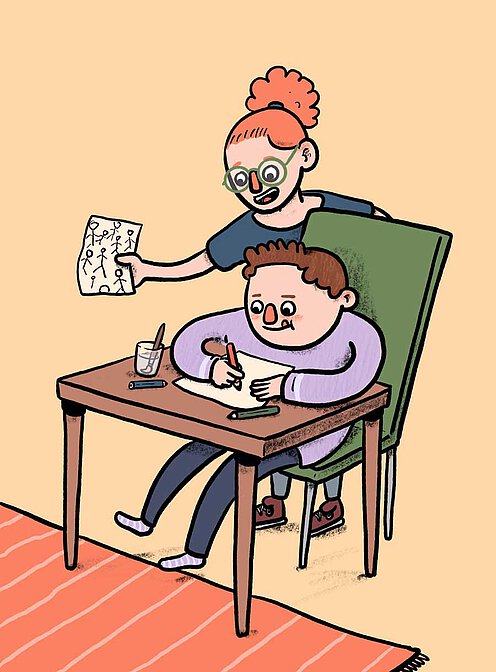

Moritz malt ein Strichmännchen.
Seine Mutter findet das langweilig und fragt: „Fällt dir nichts anderes ein?“

Moritz draws a stick figure.
His mother finds it boring and asks, "Can't you think of anything else?"

„Wieso denn? Strichmännchen sind ganz toll“, meint Moritz.
Weil ihm das Strichmännchen gefällt, malt er ihm eine Sprechblase.
In der steht: „Ich bin nicht langweilig.
Ich bin sogar besonders schön.“
Noch schöner wäre natürlich, wenn es richtig lebendig sein könnte, überlegt Moritz. Dazu murmelt er: „Es soll lebendig sein.“

"Why? Stick figures are great," Moritz says.
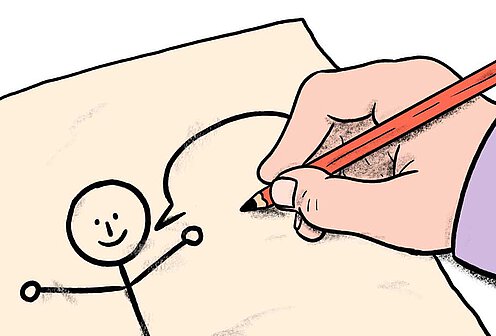
Because he likes the stick figure, he draws a speech bubble for it.
In it, it says: "I'm not boring.
Actually, I am particularly beautiful.”
It would be even better if it could really come to life, Moritz considers.
So he mutters, "It should be alive."

Daher wundert er sich auch gar nicht, als er aus dem Bild ein Geräusch hört.
Wie der Husten eines Strichmännchens klingt es.
Jedenfalls stellt sich Moritz vor, dass Strichmännchenhusten so klingen müsste.
Ein bisschen raschlig und leise,
irgendwie nach Papier.
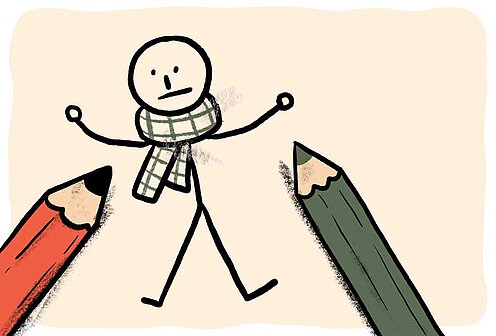
Und weil das Männchen hustet, malt ihm Moritz einen Schal um den Hals.
„Warum hustest du nur und sprichst nicht?“

Therefore, he is not surprised when he hears a sound coming from the picture.
It sounds like the cough of a stick figure.
At least, Moritz imagines stick figure coughs would sound like that.
A bit scratchy and quiet, somehow like paper.
And because the figure is coughing, Moritz draws a scarf around its neck.
"Why are you only coughing and not speaking?"

Zwei vorwurfsvolle Punktaugen sehen ihm aus dem Bild entgegen.
Und eine Strichhand zeigt auf einen Strichmund. Ein winziger Strich ist das.
Mit dem kann man nicht reden, höchstens ein bisschen husten.
„Tut mir leid“, entschuldigt sich Moritz.
„Ich mal dir sofort einen passenden Mund.“
Gleich darauf hat das Strichmännchen einen sehr großen, sehr schwungvollen Mund.
„Endlich kann ich reden“, sagt es mit lauter Stimme und spuckt die Sprechblase weg.

Two accusing dot eyes look at him from the picture.
And a stick hand points to a stick mouth.
It's a tiny line.
You can't talk with that, just cough a little.
"Sorry," apologises Moritz. "I'll draw you a suitable mouth right away.”
Immediately, the stick figure has a very large, sweeping mouth.
"Finally, I can talk," it says loudly and spits away the speech bubble.
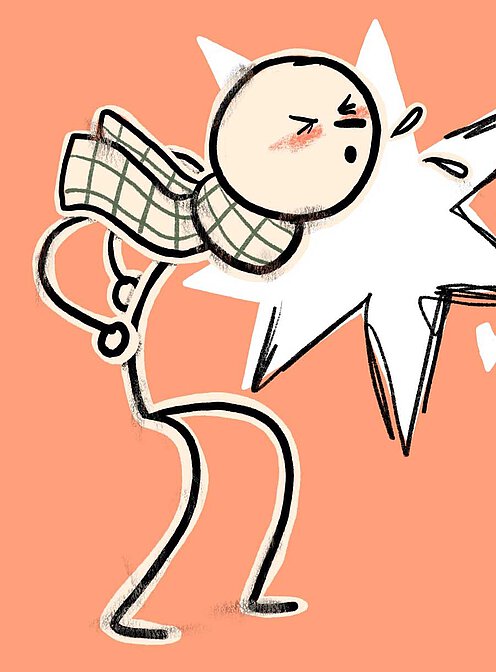
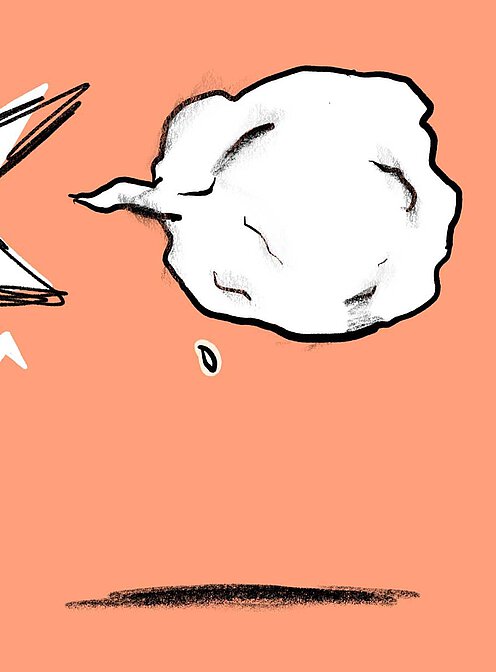

Dann nimmt es den Schal ab, springt aus dem Bild und will wissen: „Bin ich wirklich schön genug?“
„Mhh“, murmelt Moritz unsicher.
Das Männchen steht nämlich ein wenig wackelig und ziemlich dünn vor ihm auf dem Tisch.
Moritz holt einen Taschenspiegel.
Als er mit dem Spiegel zurückkommt, stolziert das Strichmännchen groß wie ein Bleistift über den Tisch.

Then it takes off the scarf, jumps out of the picture, and wants to know: "Am I really beautiful enough?"
"Mhm," mumbles Moritz uncertainly.
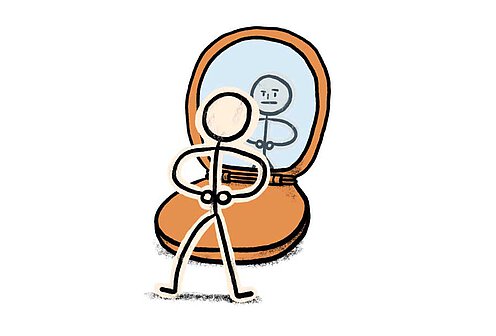
The little man standing on the table in front of him is namely a bit wobbly and quite thin.
Moritz fetches a pocket mirror.
When he comes back with the mirror, the stick figure struts across the table as tall as a pencil.

Es probiert seine Beine aus und schlenkert mit den Armen.
Eigentlich humpelt es ziemlich, muss Moritz zugeben.
Deswegen verlangt es auch: „Jetzt malst du erstmal mein linkes und mein rechtes Bein gleich lang.
Dazu schön kräftig, damit ich schnell laufen kann.
Und dann möchte ich an jeder Hand fünf Finger, nicht links vier und rechts sechs.“
Das klingt alles sehr laut und ziemlich unfreundlich.

It tries out its legs and swings its arms.
Actually, it limps quite a bit, Moritz has to admit.
That's why it demands: "Now you first draw my left and right leg the same length.
Nice and strong, so I can run fast.
And then I want five fingers on each hand, not four on the left and six on the right."
That all sounds very loud and quite unfriendly.
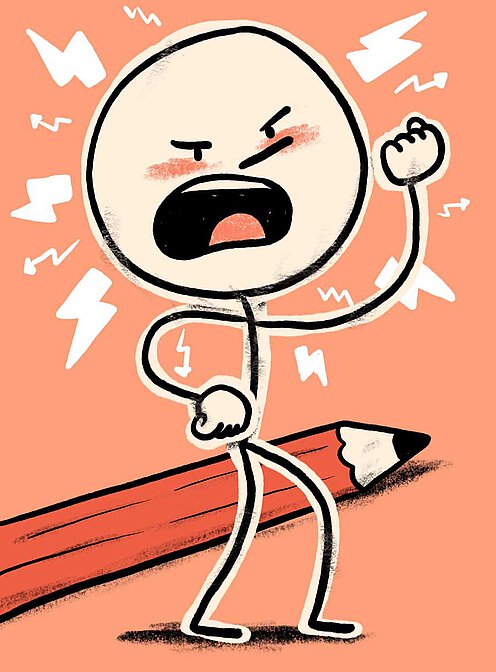

Sofort malt Moritz jetzt alles so, wie es das Strichmännchen haben möchte.
Als sich das Strichmännchen im Spiegel sieht, schimpft es schon wieder: „Was hast du mir denn da für einen Bollerkopf gemalt?
Ich will schön sein, richtig schön, das schönste Strichmännchen überhaupt.“

Moritz immediately draws everything as the stick figure wants.
When the stick figure sees itself in the mirror, it scolds again: "What kind of big head did you draw for me?
I want to be beautiful, really beautiful, the most beautiful stick figure ever."

„Dann bleib liegen“, sagt Moritz, „ich will dich so schön malen, wie ich nur kann.“
Er malt und malt.
Vor Anstrengung hat er einen roten Kopf.
Das Männchen wird wirklich immer schöner.
Er freut sich, und er hofft sogar, dass ihn das Strichmännchen lobt. Wenigstens ein bisschen.

"Then stay still," says Moritz, "I want to paint you as beautifully as I can."
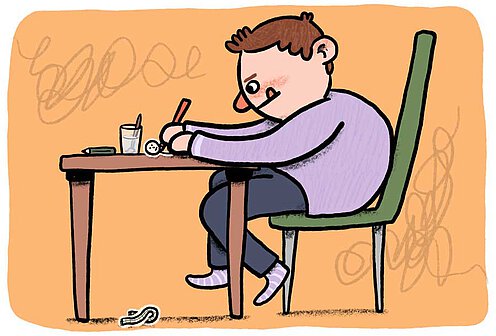
He paints and paints.
With all that effort, he has a red face.
The figure is really becoming more and more beautiful.
He's excited and even hopes that the small stick figure will praise him. At least a little.

Aber das denkt nicht daran.
„Weiß nicht, ob ich schön genug bin“, nörgelt es.
„Warum hast du was an und ich nicht?
So nackt laufe ich nicht mehr herum.
Mal mir einen Anzug.“
Vielleicht friert es, denkt Moritz.
Es hat vorhin gehustet.
Also malt er einen Anzug.
„Das passende Hemd dazu!“ wird ihm befohlen. „Und Schuhe, Strümpfe, einen Hut. Mal alles, was man als Herr braucht.“
Schließlich hat Moritz auch das geschafft.

But it doesn't even think about it. "Don't know if I'm beautiful enough," it grumbles.
"Why are you wearing something and I'm not?
I don’t want to run around naked like that anymore. Draw me a suit!"
Maybe it's cold, thinks Moritz.
It was coughing earlier.
So he draws a suit.
"And a matching shirt!" he is commanded. And shoes, socks, a hat. Draw everything a gentleman needs."
Finally, Moritz manages that too.
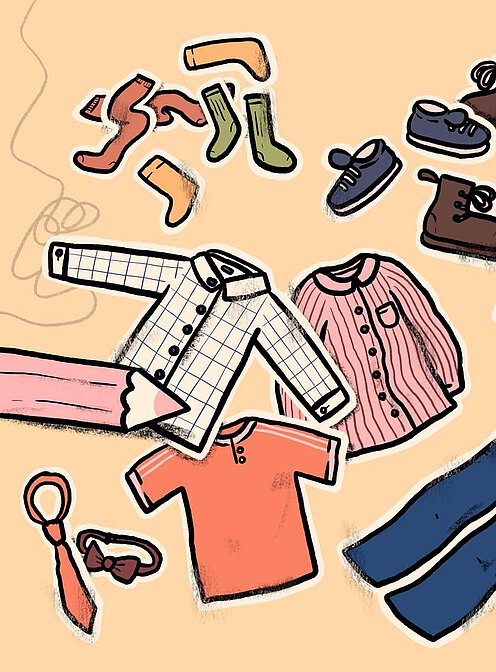
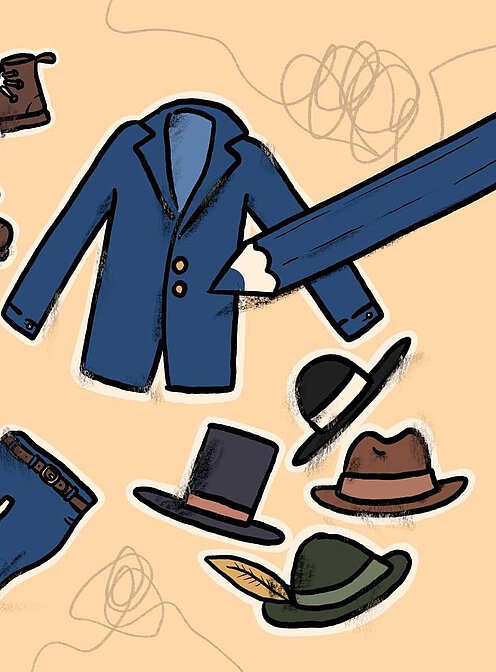

Einigermaßen zufrieden dreht sich das Strichmännchen vor dem Spiegel hin und her und verlangt: „Stell mich auf den Teppich.“
Moritz beobachtet den bleistiftgroßen Herrn, der da unten herumstolziert.
Der sieht gar nicht mehr wie ein Strichmännchen aus.

Somewhat satisfied, the stick figure turns back and forth in front of the mirror and demands: "Put me on the carpet."
Moritz watches the pencil-sized gentleman strutting around below.
He doesn't look like a stick figure anymore.
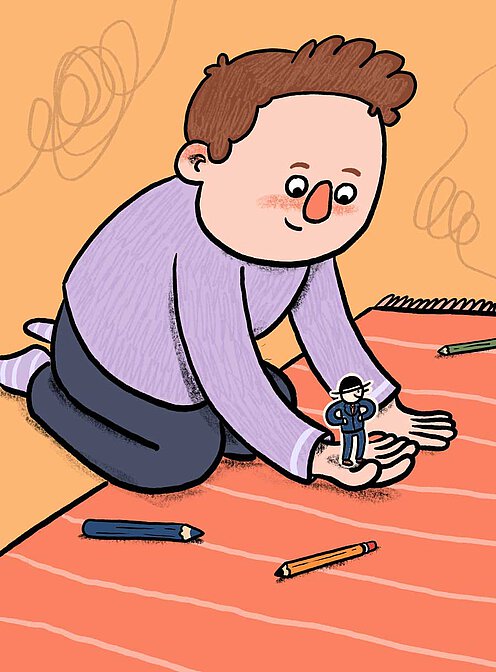

Hab´ alles gemalt, wie er das wollte, denkt Moritz zufrieden.
Da ruft es von unten: „Schön bin ich, kräftig bin ich und schnell genug auch. Jetzt habe ich Zeit für andere Dinge. Mach mir was zu essen. Gänsebraten will ich.“
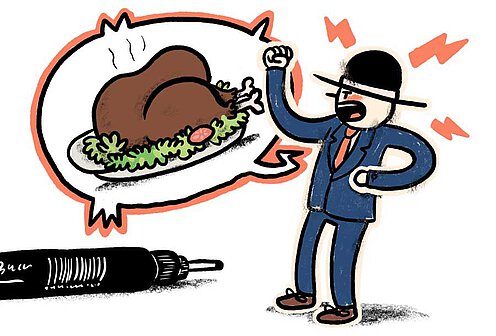
Eigentlich ist das klar, denkt der kleine Moritz. Lebendige Strichmänner brauchen was zu essen. Leider kann Moritz nicht mal ein Suppenhuhn malen.

I've drawn everything as he wanted, thinks Moritz contentedly.
Then it calls from below: "I'm beautiful, strong, and also fast enough now. Now I have time for other things. Make me something to eat. I want roast goose."
Actually, that makes sense, thinks little Moritz. Living stick figures need something to eat. Unfortunately, Moritz can't even draw a chicken.

Gänsebraten schafft er erst recht nicht.
„Eine Banane könnte ich dir malen“, bietet Moritz an.
„Muss ich eben Banane essen“, stöhnt es.
Moritz überreicht das gelbe Ding.
Der kleine Herr beißt hinein und schreit los: „Die ist ja nicht reif!
Wehe, du machst so was noch mal!

Roast goose he definitely can't do.
"I could draw you a banana," offers Moritz.
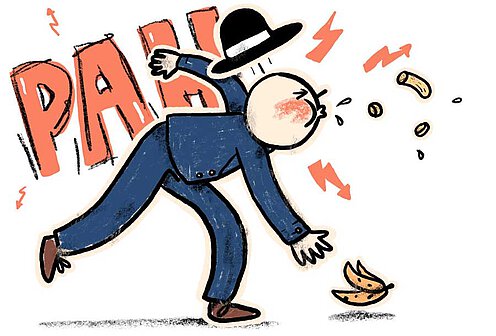
"I'll just have to eat a banana," it sighs.
Moritz hands over the yellow thing.
The little gentleman bites into it and shouts: "It's not ripe!
Don't you dare do that again!

So … und jetzt will ich Milch,
eine reife Banane und Äpfel.
Einen großen roten Pudding wirst du ja wohl schaffen.
Bratwürste sind auch leicht zu malen.
Dazu eine Bockwurst, Schokolade und Schinken.“
Moritz malt und malt ohne aufzusehen.
„Schneller!“ wird er angefeuert, „das möchte ich größer, das auch.
Das ist nicht schön genug“, hört er.
„Noch eine Bratwurst.
Die war sehr gut, aber bitte mit Senf.“

So... now I want milk, a ripe banana and apples.
You should be able to manage a large red pudding.
Grilled sausages are also easy to draw.
Along with a frankfurter, chocolate and ham."
Moritz draws and draws without looking up.
"Faster!" he's encouraged, "I want that bigger, and that one, too.
That's not beautiful enough," he hears.
"And another sausage. That was very good, but with mustard please."
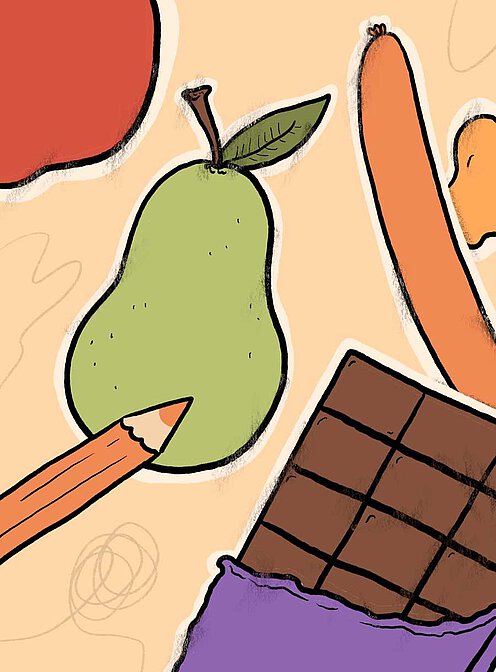
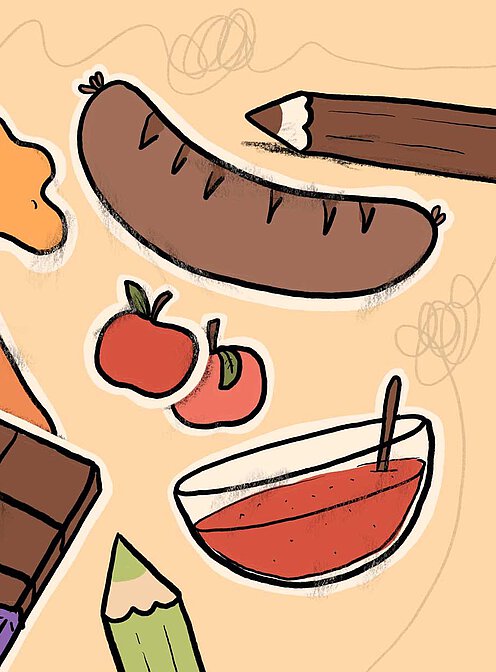

„Ich will Möbel“, sagt der kleine Herr jetzt.
Und Moritz malt ein ganzes Zimmer voller Möbel. Das Männchen stolziert auf dem Blatt herum und gibt Anweisungen.
„Diesen Stuhl etwas bequemer. Hier malst du einen Tisch hin.“

"I want furniture," says the little gentleman now.
And Moritz draws a whole room full of furniture. The figure struts around on the paper and gives instructions.
"Make this chair a bit more comfortable. Draw a table right here."
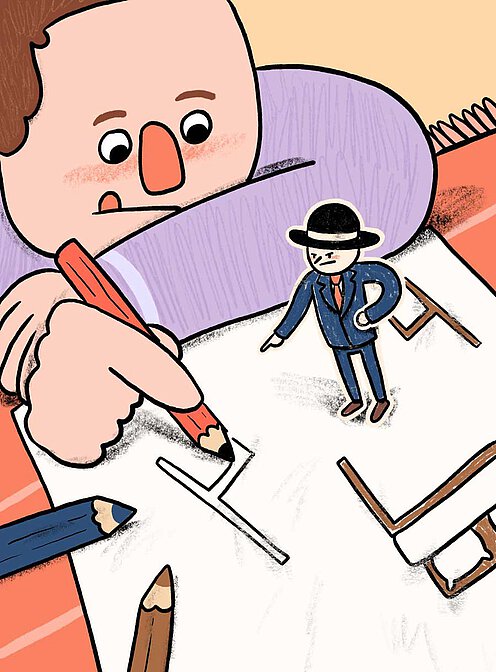

So gut er kann, malt Moritz das alles.
„Na ja“, meint das Männchen dazu, „man muss mit dem zufrieden sein, was man so bekommt.“
Dann setzt es sich zur Probe auf den Stuhl und legt sich ins Bett.
„Ich wünsch mir ein passendes Haus zu den Möbeln.“

As well as he can, Moritz draws it all.
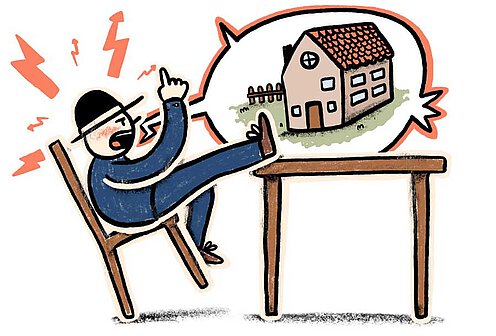
"Well," says the figure, "one must be satisfied with what one gets."
Then he sits down to test the chair and lies down in bed.
"I wish for a matching house for the furniture."

„So ein großes Stück Papier habe ich nicht“, sagt Moritz.
„Dann kleb zwei Blätter aneinander“, hört er.
Moritz klebt und malt, obwohl er immer weniger Lust hat, etwas für diesen komischen kleinen Herrn zu tun.
Als das Haus fast fertig ist, beschwert der sich schon wieder.
Und weil sich Moritz darüber ärgert, lässt er einfach ein Teil vom Dach offen.
Auch die Sonne, die er schon fertig hat, übermalt er.
Dafür malt er Regenwolken.
Der kleine Herr stolziert herum und merkt gar nichts davon.

"I don't have such a big piece of paper," says Moritz.
"Then glue two sheets together," he hears.
Moritz glues and draws, even though he has less and less desire to do something for this strange little gentleman.
When the house is almost finished, he complains again.
And because Moritz is annoyed by it, he just leaves a part of the roof open.
He even paints over the sun he had already drawn. Instead, he draws rain clouds.
The little gentleman struts around and doesn't notice a thing.
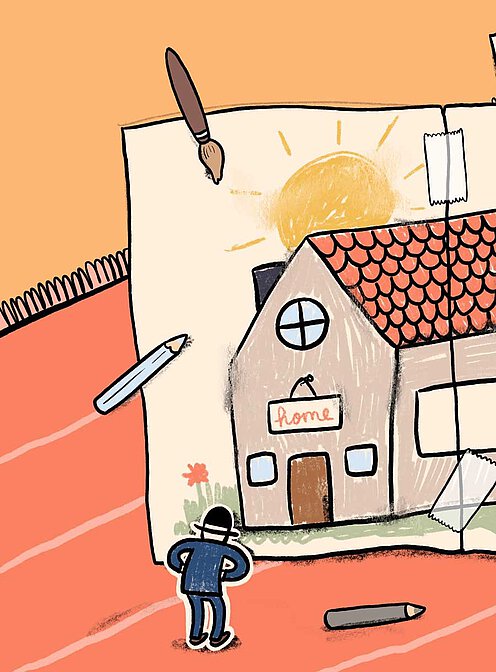
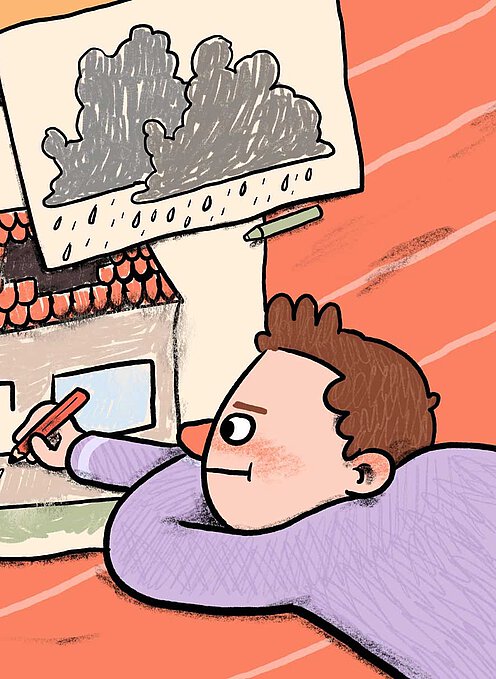

„Endlich ist mein Haus fertig. Wird ja auch Zeit“, sagt er.
Dann öffnet er die Tür und ist verschwunden.
Schnell pinselt Moritz Regen auf das Blatt.
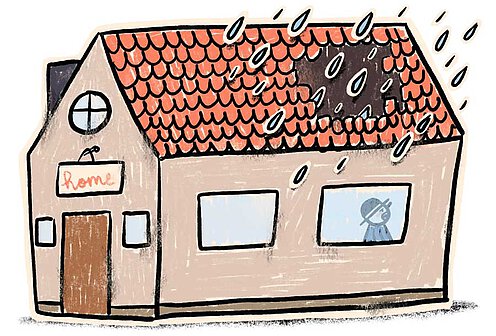
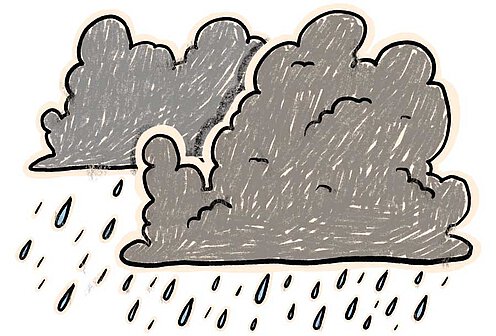

"Finally, my house is finished. It's about time," he says.
Then he opens the door and disappears.
Moritz quickly paints rain on the paper.

Gleich darauf rennt der kleine Herr aus dem Haus. „Schlamperei!“ schimpft er.
„Da regnet es durchs Dach. Mal es dicht!“
„Mach ich nicht“, sagt Moritz da zum ersten Mal.
„Sofort machst du das!“ befiehlt der kleine Herr.
Moritz schüttelt den Kopf und sagt jetzt:
„Ich tue gar nichts mehr für dich, wenn du nicht freundlicher wirst.“
Jammernd und zeternd steht das Strichmännchen da.
Dann rennt es in sein Haus und wirft die Tür hinter sich zu.

Soon after, the little gentleman runs out of the house. "Shoddy construction!" it scolds.
"It's raining through the roof. Paint it watertight!"
"I won't do it," says Moritz for the first time.
"Do it right now!" commands the little gentleman.
Now Moritz shakes his head and says: "I won't do anything else for you if you don't become friendlier."
Ranting and raving, the stick figure stands there.
Then it runs into its house and slams the door behind itself.
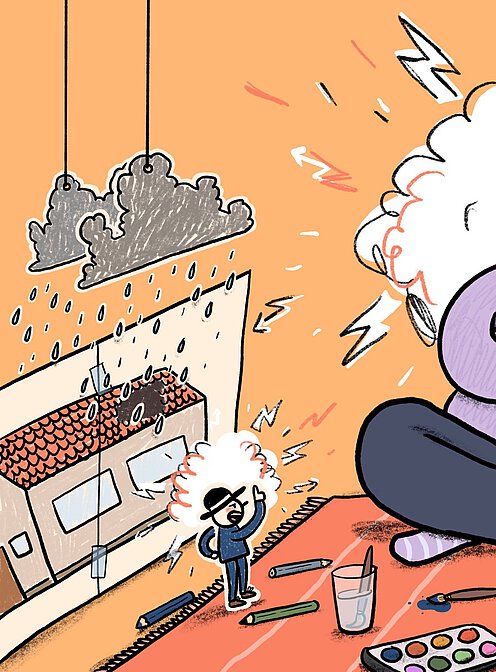
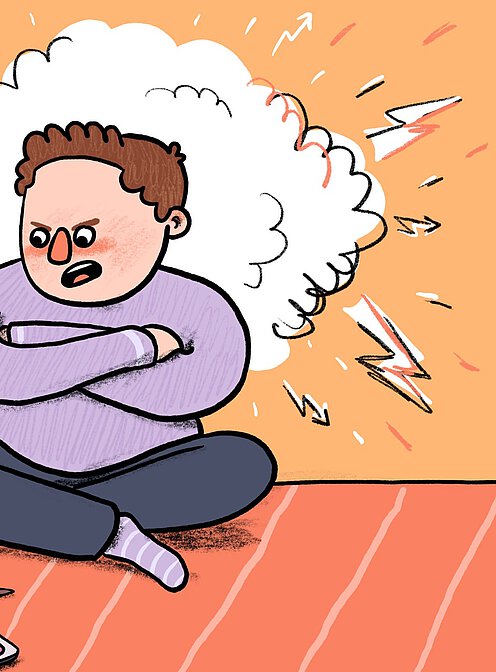
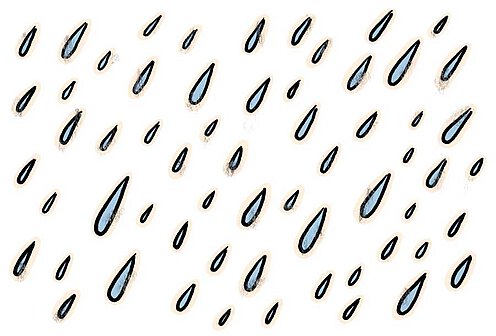

„Ich hab dich so gut gemalt, wie ich das kann“, sagt der kleine Moritz.
„Besser schaffe ich es nicht.“
Aber aus dem Haus hört er nur empörtes Heulen.
Und weil das Moritz ärgert, malt er noch mehr Regen auf das Blatt.
Aufgeweicht und zerlaufen kommt der kleine Herr aus dem Haus.

"I've painted you as well as I can," says little Moritz.
"I can't do it any better."
But all he hears from inside the house is outraged wailing.
And because that annoys Moritz, he paints even more rain on the paper.
Soaked and smeary, the little gentleman comes out of the house.

„Mach mir was zu essen.
Was Warmes zu trinken will ich auch.
Und vor allem malst du mir ein ordentliches Dach.“
Irgendwie hat Moritz Mitleid mit dem Strichmännchen.
Es steht so jämmerlich da.
Deswegen fängt er wieder mit dem Malen an.
„Schneller! Schneller!“ hört er.
„Mal bunter, mal schöner!“ ruft es.

"Make me something to eat.
I also want something warm to drink.
And above all, paint me a proper roof."
Somehow, Moritz feels sorry for the stick figure.
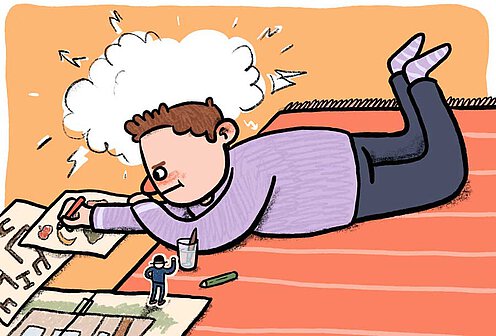
It looks so pitiful.
That's why he starts painting again.
"Faster! Faster!" he hears. "Paint it more colourful, more beautiful!" it calls.

Da stößt der kleine Moritz vor lauter Hast den Wassertopf um.
Wasser läuft über das Papier. Farben zerfließen, alles weicht auf.
Die Farben fließen ineinander.
Das Haus, die Möbel, der Garten, alles ist ein großer Farbfleck.

In a hurry, little Moritz accidentally knocks over the water pot.
Water runs over the paper. Colours run, everything gets soggy. The colours run into each other.
The house, the furniture, the garden, everything is a big blur of colour.
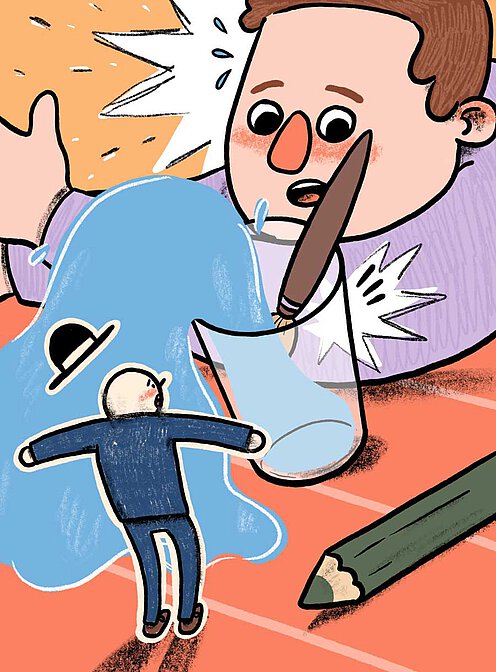

Moritz zerknüllt sein Bild und wirft es in den Papierkorb. Eigentlich ist er froh, dass das Strichmännchen verschwunden ist.
Als er zu seiner Mutter in die Küche geht, fragt sie: „Wie geht´s deinem Strichmännchen?“
„Nicht so gut“, antwortet er und erzählt, wie das Strichmännchen war und wo es jetzt ist.
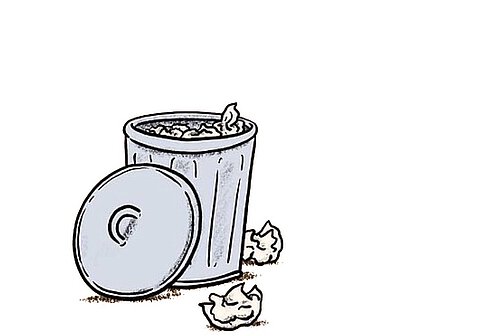
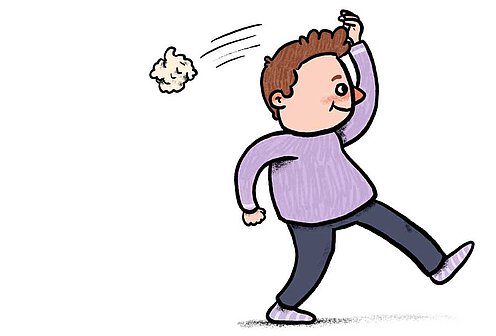

Moritz crumples up his picture and throws it in the bin. He is actually happy that the stick figure is now gone.
When he walks over to his mother in the kitchen, she asks: “How is your stick figure doing?”
“Not too well“, he answers and tells his mum how the stick figure behaved and where it is now.

Ende

The End
Gehe zu …
